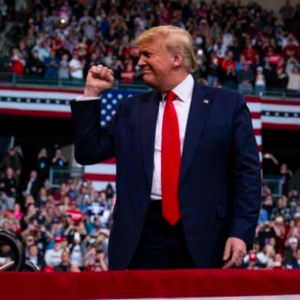What if America needed Donald Trump’s presidency? What if President Trump currently embodies Jefferson’s recurring 20 years rebellion?
What if all of it — Trump’s trampling of norms; his “Deep State” enemies lists; his public interference in criminal prosecutions; his efforts to profit from his presidency; his sanctimonious self-aggrandizement; and cartoonish extension of the unitary executive theory and executive privilege — inspires a serious debate over the Constitution’s balance of power?
President Trump’s critics have decried his unmoored conduct in office. We watched agog as his brand of nationalist populism displaced well-formed conservative philosophy, and as his demand for absolute fealty from the government and the Republican Party reshaped both in less than a single presidential election cycle.
But what if there exists an inherent flaw in the balance of power within the Constitution? What if this debate reveals President Trump and his sycophants are more right than wrong historically, or as a matter of law?
In other words, what if the Trump-era debate is less about this particular executive than about the power of the presidency? About Congress’s multigenerational abdication of power, and a structural weakness in James Madison’s otherwise brilliant design — one that President Trump and Attorney General William Barr are now exploiting to their advantage.
Take Marbury v. Madison, for example. The 1803 case established the Supreme Court’s power to declare an act of Congress unconstitutional. There, the roots of President Trump’s claim to unfettered Article II powers are firmly planted.
“The province of the Court is solely to decide on the rights of individuals, not to inquire how the Executive or Executive officers perform duties in which they have a discretion. Questions, in their nature political or which are, by the Constitution and laws, submitted to the Executive, can never be made in this court,” wrote Chief Justice John Marshall.
Marbury also provides the underpinnings of the president’s executive privilege shield. “The intimate political relation, subsisting between the President of the United States and the heads of departments, necessarily renders any legal investigation of the acts of one of those high officers peculiarly irksome, as well as delicate, and excites some hesitation with respect to the propriety of entering into such investigation.”
As far back as 1831, a president’s attorney general provided a formal opinion that the president had the ability to affect the course and outcome of a criminal prosecution. While the particular U.S. attorney was free to disregard the president’s counsel, the president was equally free to remove that U.S. attorney, as they serve only at the president’s pleasure.
If party factionalism renders impeachment and removal politically impossible and Congress unable to deploy its Article I powers to reign in the executive, then these same issues were destined to emerge even if Trump had never been elected.
In that regard, what if the Trump era proves a net positive for American democracy?
Not from a policy perspective, certainly. And not from the intellectual growth of conservative thought, nor the growth of Republican competence in government. But what if President Trump’s on-going stress test of Madison’s constitutional system of checks and balances illustrates the need to redefine and limit executive power?
During the debates over the Constitution’s ratification, Hamilton dubbed the judiciary the “weakest” branch. So weak, in fact, that “all possible care is requisite to enable it to defend itself against attacks” from the Executive and Legislative branches. Even before social media and presidential tweet storms, Hamilton recognized the judiciary was “in continual jeopardy of being overpowered, awed, or influenced by its co-ordinate branches.”
Today, President Trump seeks the unification of the executive branch’s law enforcement and prosecutorial authority with the Judicial branch’s power of judgment.
But, thankfully, Hamilton was wrong. The modern, independent judiciary is not the weakest branch. It has become the strongest — and most dependably functioning — branch of the federal government. At present, it is the only branch able to restrain executive power.
The judiciary was then, as it is now, liberty’s most indispensable branch. As Hamilton wrote, “[L]iberty can have nothing to fear from the judiciary alone, but would have everything to fear from its union with either of the other departments.”
Here, Hamilton was right, and it is a balance of power principle we must guard jealously against the incursion of a corrupt, transactional executive.

